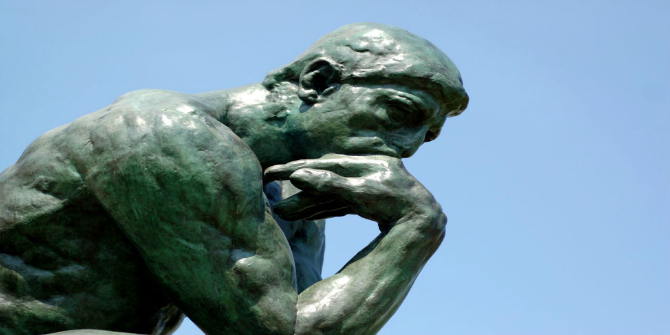 Religion is prevalent in world politics today, and international relation theory is at pains to understand and explain this phenomenon. This unique study aims to introduce political theology as an appropriate tool to the study of international relations, revealing the Christian foundations of the discipline and delivering a critique of some of its most fundamental theoretical elements, such as its secular view of religion as part of the irrational and its negation of theism in its understanding of responsibility in world politics. James Walters finds a refreshing book that reminds us that the line between the religious and the non-religious is more fluid than late modernity has come to think.
Religion is prevalent in world politics today, and international relation theory is at pains to understand and explain this phenomenon. This unique study aims to introduce political theology as an appropriate tool to the study of international relations, revealing the Christian foundations of the discipline and delivering a critique of some of its most fundamental theoretical elements, such as its secular view of religion as part of the irrational and its negation of theism in its understanding of responsibility in world politics. James Walters finds a refreshing book that reminds us that the line between the religious and the non-religious is more fluid than late modernity has come to think.
God and International Relations: Christian Theology and World Politics. Mika Luoma-Aho. Continuum. May 2012.
Religion has become a far more prominent topic of research in International Relations over recent years, particularly since the events of 11 September 2001 which pointed to a serious deficiency in this field. But if religion has become a less embarrassing subject for social scientists, there are still very few who are prepared to talk specifically about God and about possible theological implications for the study of their discipline. This is what makes Mika Luoma-aho highly unusual. He has written this book from the premise “that ‘the world’ is not all there is to it: that there is a God whose existence is relevant to the life of individuals, their communities, and the conditions they accommodate” (pp.xii-xiii). The theologies of most world religions assume that God is indeed relevant to such things, and since the vast majority of the global population follow these beliefs, his approach should not be as controversial as it appears. But he acknowledges that in contemporary IR circles it is at the very least unconventional and he seeks to demonstrate a serious of ambitious claims to justify this approach.
First he sets out a common conceptual method for thinking about theology and international relations in focusing on the importance of symbolism. In particular the semiotics of the human body emerges as both a central image in Christian theology and an enduring mode of representation for the nation state (e.g. Hobbes’ Leviathan). From this he draws on the work of the German philosopher Carl Schmitt to argue that the nation has become a secularised version of divine sovereignty. The peace of Westphalia, seeking to remove the conflicts of religion from the political sphere, led to the deification of the nation state itself.
This is the basis for his central attack on conventional IR as proceeding in a quasi-religious manner, failing adequately to challenge the legitimations of power in the international system. To the author, states are constructed entities that acquire an idolatrous status through their adoption of personhood: “we are employed by an idol, an imaginary being of the unseen world, to legitimize a political hierarchy over human life” (p.55). As with all idols, this state system fails to live up to what it promises, and the final argument of the book is to contend that “the myth of the state as ‘peacemaker’ lingers on despite glaring historical and ongoing evidence to the contrary” (p.xv). The author is pessimistic about the abilities of the current international system to bring about a better world. His analysis of the text of the United Nations Millennium Declaration finds it to be fundamentally lacking in moral depth, exposing a widening gulf between the human conscience and the reasoning employed in global politics. The “secular religion” of contemporary international relations fails to deliver on its promises.
This is an iconoclastic book. Many will dismiss it as excessively confessional but, in part, because they will be unsettled by the accusation that their assumptions are less self-evident than they had believed. The need for this radical thinking is great when the dangers of extreme nationalism and state isolationism are threatening global solidarity. And we should hardly be surprised that Christian theology proves a powerful resource here. On a daily basis, clergy and their congregations (particularly in cities such as London) are engaged in struggles against the brutalities of the immigration and asylum systems with their unquestioned logic of “the entitled” and “the unentitled”, a logic that runs directly against the principles of Christian community articulated in the New Testament.
But iconoclasts only get you so far, and I am from a theological tradition that refuses to polarise the community of the Church and the community of the nation in the manner we find in this book. Luoma-aho does not engage with thinkers who have viewed the relationship of Christianity and national order as more dialogical (Richard Hooker, Samuel Taylor Coleridge and William Temple to name some of my favourites). I can go along with his call for “a systematic questioning of the ultimate value of national state in our personal and collective lives.” (p.155), but I am left wondering quite what would be involved in “a more comprehensive dismantling” (p.151) of the current system. Surely not a return to Imperial Christendom? At a time when the ravages of the transnational free market are apparent to all but the extreme right, we must surely acknowledge the essential role to be played by national governments in regulating markets for the benefit of their citizens. Even Pope Benedict (who might well feel some affection for Imperial Christendom!) concedes in his encyclical ‘Caritas in Veritate’ that only the State can regulate the international flows of trade, capital and labour “to promote a person-based and community-oriented cultural process of world-wide integration that is open to transcendence” (para.42).
This is a refreshing and necessary book that reminds us that the line between the religious and the non-religious is more fluid than late modernity has come to think. It exposes the dangers of concretising metaphor and of accepting as given secular notions in which people have invested a good deal of blind faith. Christian theology is an important resource for examining the ultimate ends of our societal institutions and Luoma-aho has articulated its deconstructive spirit, a spirit he describes as “a stick of anarchical dynamite” (p.154). But international community is fragile and Christian theology’s contribution to its development may need to be more precise, more incremental, and more gentle.
——————————————————————————————-
James Walters is chaplain to the London School of Economics. He has a doctorate from Cambridge University in systematic theology and philosophy of religion and he is the author of Baudrillard and Theology (Continuum 2012). Before coming to LSE, James was a parish priest in North London and prior to ordination he worked for a Member of Parliament. He is now a member of the advisory board to LSE’s Programme for the Study of Religion and Non-Religion and his areas of research include the theology of money and religion in the public sphere. Read more reviews by James.








Thank you for writing this review. I happened to be looking for information about IR theory and Christianity. I have not read this book yet, but I’m intrigued so far. My interest was recently piqued after watching the PBS series “Civilization” (whose overall argument I don’t generally agree with). The British historian’s contention is that the Protestant work ethic explains the material success of Western civilization and also heralds the future fall of modern secular Europe.
If viewed from IR lense, could it be argued that the emphasis on working hard not for man but for God, practicing frugality and shunning ostentation – this Christian influence on Protestant-majority countries – could be considered an idea in the context of social constructivim theory’s “material/ideational” debate (role of material forces vs ideas)?
Does this book examine religion using this IR theory’s approach? Does it discuss Christianity as embodied by international entities/NGOs such as Catholic charities, missionary aid agencies and the like and their role as non-state actors? It appears that the author gives credence to post-positivist theories in his comparison to “anarchical dynamite.”
What I’m particularly interested in is this: Protestant faith’s role in tempering the tendency toward selfish pursuit of profit in capitalist societies. I say Protestant because there appears a greater income gap between rich and poor in Catholic-majority countries.
I grew up Catholic and am greatly indebted for an excellent education. Due to doctrinal differences though, I am now attending a Protestant church, and what I notice is that regular people assume far more responsibilities and thus are more engaged than in Catholic church. It seems that Protestant church practices are more democratic, thus helping its congregants on a weekly basis grow in leadership responsibilities and assertiveness. Contrast that to the Catholic Church’s relatively rigid hierarchy of priest vs parishioners (top-down organization) which seems to foster dependency on a weekly basis.
So I wonder if the difference in variations of the Christian faith can not only explain the difference in economic strength among nation states but also in the degree of corruption as well. Many Protestant churches publish their financial statements, but the Roman Catholic Church does not provide the same transparency which may explain the corruption scandal in the Vatican. Maybe the level of bureacratic corruption in a country may reflect the degree of corruption in its majority churches.
Having said this, I am so happy that God picked Pope Francis I – the Holy Spirit really moved the papal conclave. He strikes me as a Protestant – in fact the Jesuit order seems rather Protestant to me (perhaps subconsciously created in response to the Protestant Reformation). I personally think that’s the RC Church needs to do – return to the way the early Christians lived.
Perhaps he will allow priests to marry – what’s ironic is that the first Pope ever was Peter – a married man! If papal infallibility is indeed a venerable doctrine, why is not the example of the first pope – Jesus’s Rock for His Church – considered as part and parcel of that belief? Jesus certainly tell Peter that he couldn’t lead his church because he was married.